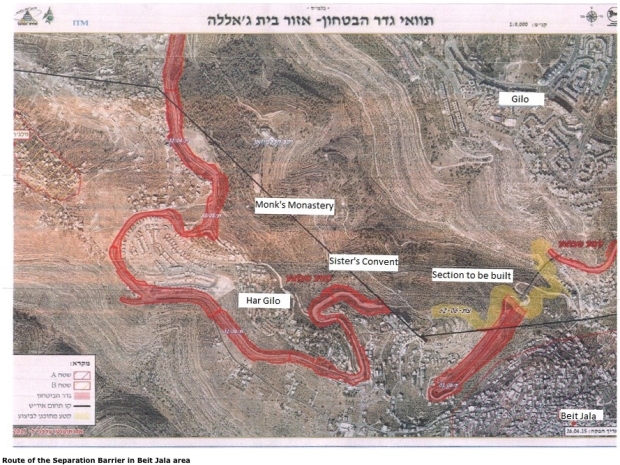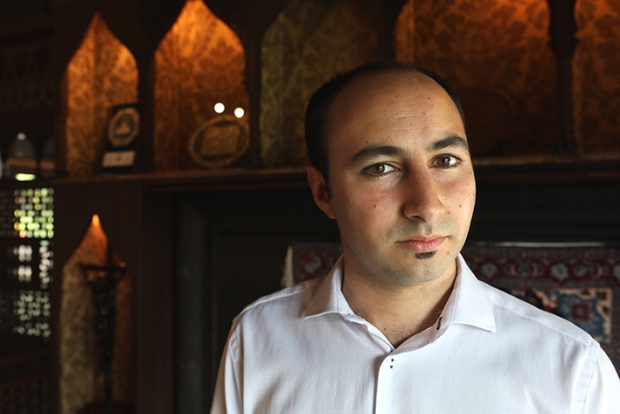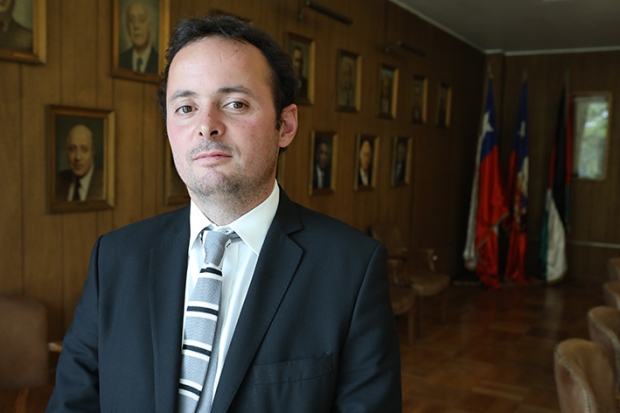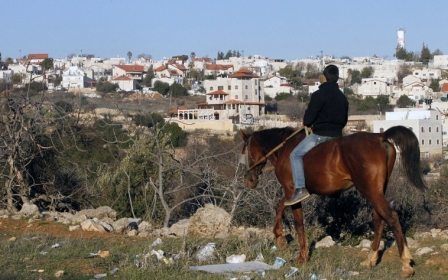So far, yet so near: Palestinians in Chile defend their homeland
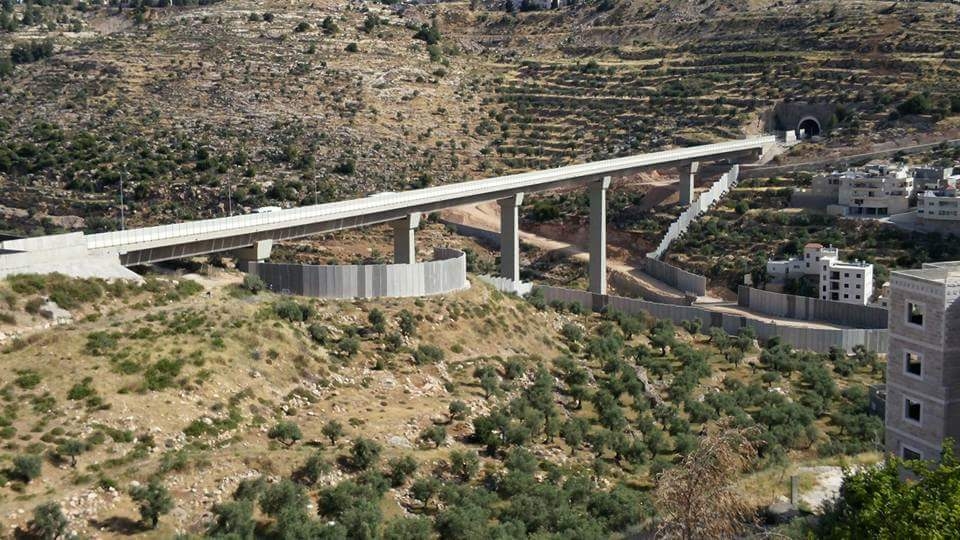
SANTIAGO - Though the Palestinian Club in Santiago de Chile is around 14,000 kilometres away from the West Bank, the plight of the Palestinian people is far from a distant memory for the Chilean Palestinian community using its complex of sports facilities, recreational grounds and conference rooms.
An estimated 350,000 Palestinians and their descendants live in Chile, making it the largest group of Palestinians living outside of the Arab world. Most are Christians who originally emigrated from the Bethlehem area, especially Beit Jala, the city that rises from the Cremisan Valley in the occupied West Bank.
They often remember their now-forgotten farms in the fertile area that is dotted with ancient olive trees, some from Roman times, which produce a high quality olive oil treasured all over Palestine.
The valley is also one of the last green spaces in the region offering a respite from urban life; and a Catholic monastery with a nearby vineyard and convent that hosts a school for children is central to citizens. More than 15,000 people who are predominantly Christian have lived peacefully in this municipality for generations.
According to Israeli rights group B'Tselem, the area west of the separation wall is among the most fertile in the West Bank, as it generates eight percent of overall Palestinian agricultural production.
But in 2002, the construction of Israel's separation wall started and dramatically changed the life of many residents. In 2012, 65 percent of the barrier, which is 709 kilometres long, was already built.
B’Tselem stated that 85 percent of the wall runs through Palestinian territory instead of following the Green Line, the 1967 borders. Every time a new section of the wall is erected, the problems in the Cremisan Valley unfold again. The separation barrier runs through land owned by 58 Christian Palestinian families.
Many of the affected landowners filed a lawsuit against the order and started a 10-year-long legal battle. The Society of St Yves Catholic Centre for Human Rights joined the legal proceedings as well.
European and North American bishops as well as European representatives visited the valley to oppose the plan, but neither local nor international support achieved much on the ground.
Concrete slabs and uprooting of trees
Olive groves have been uprooted and replaced with the concrete barrier that separates the West Bank city of Beit Jala from the settlement of Har Gilo and the village of Walaja. Villagers have been barred from reaching their water resources, and families have lost their livelihood, either by expropriation or isolation of the fields.
The concrete slabs are just one element of the operation. There are also trenches, barbed wire and control towers, which restricts the movement of Palestinian residents.
In the end, Israel’s Supreme Court decided to spare the monastery, the convent and their agricultural land but approved the construction of the barrier on private Palestinian land.
The Ministry of Defence is now erecting the wall with a 225-metre gap that allows residents of nearby towns and villages to access religious buildings and community services.
Last November, the Palestinian Federation of Chile sued three judges from the Israeli Supreme Court for crimes against humanity and war crimes.
‘Israel has to understand that if they want to be part of the international community, they have to abide by the rules’
- Anuar Majluf, Executive director of the The Palestinian Federation of Chile
“Israel has to understand that if they want to be part of the international community, they have to abide by the rules," the executive director of the Palestinian Federation of Chile, Anuar Majluf, told Middle East Eye.
“It’s unacceptable that the country that has breached the most UN resolutions hasn’t been held accountable,” he added.
Universal jurisdiction
The federation argued that the decisions taken by Asher Gronis, Uzi Vogelman and Neal Hendel, which allowed Israel to confiscate Palestinian land in the Cremisan Valley to build the separation wall, gave legal appearance to an otherwise illegal practice under international law.
In 2004, the International Court of Justice, the UN's highest judicial body, issued an advisory opinion stating that Israel's separation wall was illegal.
In November 2016, the Israeli Foreign Ministry spokesman, Emmanuel Nahshon, condemned the lawsuit against the Israeli judges, calling it a “publicity stunt,” with no legal basis, but Majluf disagreed.
“Going to court is a way of putting pressure on Israel so they understand that they have to respect international law and stop violating Palestinian rights,” said Majluf.
Chile ratified the Rome Statute in 2009, which enables the country to invoke universal jurisdiction to prosecute any person for crimes included in the treaty, regardless of their nationality or the country where the crime was committed.
“A legal ruling can constitute a crime where the judge makes a devious interpretation or application of the law,” said Nicolás Pavez, one of the federation’s legal representatives on the case.
“The Supreme Court should have told the Israeli minister of defence that what he was planning was illegal. We sued these judges because they represented the highest institution in the state of Israel which made these actions appear legal,” Pavez added.
In January, the lawsuit was rejected on appeal by the Chilean judges, who said that the evidence did not prove “criminal offence,” nor could the judges’ rulings “be described as crimes against humanity or war crimes,” said the ruling.
‘We don’t lose with this decision’
- Nicolás Pavez, lawyer representing The Palestinian Federation in Chile
The decision was met with disappointment and suspicion from the Palestinian Federation in Chile.
‘We believe that the lawsuit complied with all the requirements to be accepted. We hope the decision hasn’t been motivated by other pressures," said Majluf without clarifying the comment any further. "People can interpret it as they wish," he concluded.
In the meantime, Israeli Justice Minister Ayelet Shaked celebrated the decision.
“The Chilean Supreme Court’s judgment reflects the fact that they won’t use the Chilean court system for evil, and won’t promote political agendas which are pushed forward using law suits based on unfounded claims,” she said, according to Ynet.
“This decision presents a victory for the state of Israel in the worldwide legal fight against it,” Shaked added.
'This decision presents a victory for the state of Israel in the worldwide legal fight against it'
-Israeli Justice Minister Ayelet Shaked
However, the federation’s legal team, led from Spain by renowned lawyer Gonzalo Boye, is not giving up.
Pavez said that they plan to escalate the matter to the Inter-American Court of Human Rights and maybe also file a new lawsuit against the same judges, in the coming months.
“We don’t lose with this decision," he told MEE. "There are many achievements in international law. The war crime trials in former Yugoslavia would have been unimaginable 30 years ago… Today, our aim might seem far away but we won’t be deterred. We will insist until the judiciary accepts a case and launches an investigation.”
Israel’s impunity
Despite attacks not having been reported in the area, Israel insists that it needs the barrier for security reasons.
‘We can’t see Israel as a ‘normal’ country and have relations with it when it doesn’t behave as one’
- Anuar Majluf, Executive director of the Palestinian Federation of Chile
B’Tselem has said that the aim of the wall is to connect the nearby illegal settlements of Har Gilo and Gilo and continue the unlawful annexation of land that has been taking place across the West Bank.
“In the most heavily invaded areas, the wall deviates 22km from the Green Line - the 1967 border - into Palestinian territory. This is not just a wall on the border, it is an annexation wall that invades up to 900 square kilometres in some areas and affects every aspect of daily life,” Pavez said.
He explained that this is why it is so difficult to provide a figure on the number of people that are affected either directly or indirectly by the ruling.
For Majluf, Israel’s impunity is an international problem created by the international community by the Balfour Declaration and the UN Partition Plan.
"The UN didn’t have the authority to divide territories and didn’t ask the native population their opinion on the partition. The UN has left the problem unsolved for 70 years while Israel has been allowed to violate rights and colonise Palestinian land,” he said.
“We can’t see Israel as a ‘normal’ country and have relations with it when it doesn’t behave as one.”
Middle East Eye propose une couverture et une analyse indépendantes et incomparables du Moyen-Orient, de l’Afrique du Nord et d’autres régions du monde. Pour en savoir plus sur la reprise de ce contenu et les frais qui s’appliquent, veuillez remplir ce formulaire [en anglais]. Pour en savoir plus sur MEE, cliquez ici [en anglais].


